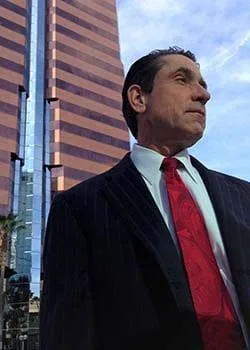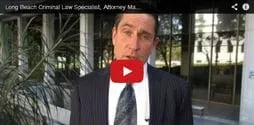Probation
A grant of probation is a term of either informal or formal supervision of a person who has been convicted of a crime but not receiving the maximum sentence. Formal probation is imposed by a court after a conviction by either a plea or trial verdict for a felony.
Probation is an alternative to an immediate prison sentence or county jail term over one year.
Probation is in essence an opportunity to prove good behavior and rehabilitation and avoid a more severe punishment. If probation is violated, a more severe punishment can and usually is imposed after a violation is proved at a violation hearing.
When a court orders probation on a felony case, the person sentenced to probation must regularly report to his or her county probation officer. In addition the probationer is required to fulfill certain conditions of the grant of probation.
The two most important conditions of any grant of probation are that the probationer report as directed to probation and to avoid being arrested and convicted of any new criminal offense. Other probation conditions can include serving up to one year in jail, attending counseling, undergoing drug or alcohol treatment and testing, paying various fines or fees, submitting a DNA sample, paying any victim or victims for their losses (restitution), and submitting to search of person and residence without a warrant. Most grants of probation require the probationer to not leave the county without the permission of the probation department.
Felony probation generally lasts for 2 years, which is typical, but can last longer if the crime carries a longer term of probation spelled out in the statute. A probationer who completes all the terms of his or her probation earlier than expected can petition the court for an early termination of probation.
If a probationer violates probation, probation can be revoked and a term over a year can be ordered to be served in either the state prison for serious and strike enhanced sentenced offenses or in county jail for non-serious charges. A person accused of violating probation is entitled to a hearing before a judge. At the violation hearing, evidence must be presented to the judge in order to prove the violation. If a violation is proved, the judge can reinstate probation or impose a term in the state prison or jail of a minimum of 16 months up to a life sentence depending on the maximum sentence for the crime of conviction. The judge has discretion to impose the low or mid term for the crime charged, and may, in some circumstances, impose the high term the charge carries.
Misdemeanor probation is almost always informal and usually can last no longer than a year. Some offenses such as DUI and domestic violence carry a three year term of probation. Informal probation means that the probationer doesn't have a probation officer, but needs to complete certain terms such as: obey all laws, pay various fines and fees, perform community service, serve some time in jail or complete a counseling program. Misdemeanor probation can be violated and a sentence imposed if the probationer fails to complete the conditions ordered.
When misdemeanor probation is violated, the court can impose the maximum jail sentence the crime carries. A misdemeanor probationer is also entitled to a hearing before a judge where the prosecutor must prove the violation by a preponderance of the evidence.
Successful completion of either felony or misdemeanor probation for the entire term of probation, meaning no violations and successful completion of all the terms of probation, can result in a successful motion to withdraw the guilty plea and dismiss the charges. A Penal Code section 1203.4 motion can be made at the end of a successful term of probation. That motion allows the probationer to withdraw his guilty plea and have the judge dismiss the charges. This dismissal can limit the future legal effect of the conviction.
When accused of a violation of probation, it is always best to have an experienced criminal law attorney represent you. Long Beach Criminal Law Specialist Matthew Kaestner regularly represents persons accused of violating their probation. He has a long record of obtaining a reinstatement of probation so that his clients avoid going to prison or serving a long jail term. He has made many successfully motions to dismiss violation allegations and get clients on the way back to successful completion.
Parole and PRCS
When someone has served a term in prison and is released, he or she is either released onto parole or post release community supervision (PRCS). Parole is the period of supervised release that occurs after a person is released from prison for certain crimes. Parole can last for up to 3 years for most offenses and is supervised by the California Department of Corrections. Persons who do exceptionally well on parole are oftentimes discharged from parole early.
Like probation, a person on parole must report to his or her parole officer regularly and fulfill the conditions of parole that can include drug testing, counseling, employment training and drug and alcohol treatment.
Unlike probation, if a parolee violates a term of his parole, he can only receive a maximum of 1 year in prison on the violation of parole. If the parolee is violated for picking up a new criminal case, he can do time on the new case as well as the violation of parole.
Like probation, a parolee is entitled to a hearing before a Department of Corrections hearings officer if he is accused of violating parole. At this hearing, the parolee is entitled under certain circumstances to have an attorney present. These circumstances include when the parolee is accused of violating his parole by committing a new serious crime.
Persons released from prison for non-violent, non-serious, and non-sexual crimes are placed on PRCS, a reentry program that is run by the county probation department, not the Department of Corrections. PRCS can last up to three years, but can end earlier, as quickly as six months and certainly after one year, if there have been no violations resulting in a custodial sanction.
A person on PRCS has to submit to search and seizure, not possess weapons, not leave the county or state for more than two days without the permission of the supervising agency, participate in rehabilitation programming as recommended, and complete conditions described in California Penal Code section 3453.
A violation of PRCS can result in “flash incarceration” for up to 10 days without a hearing for minor violations of PRCS and up to 180 days after hearing where a hearing officer finds a violation.
For any other questions about probation or parole contact Long Beach Criminal Law Specialist Matthew G. Kaestner directly at (562) 437-0200.




